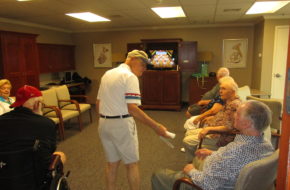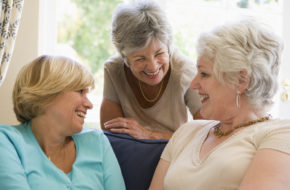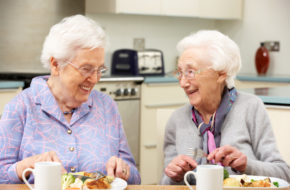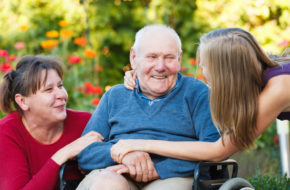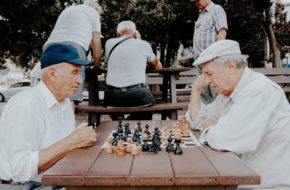NOTE: Since 2006, Jeanne Doney and her therapy dog, Bentley, have volunteered at Diakon Senior Living – Hagerstown/The Ravenwood Campus. Together, the duo offers residents a special relationship that only two hearts, two hands and four paws can give.
Jeanne Doney shares her experience:
You might say that my dog, Bentley, is giving back to the community—especially since the community saved him. You see, Bentley is a rescue dog. He was once neglected, but now he not only receives an overabundance of love at home, but he is the center of attention on the Ravenwood campus of Diakon Senior Living – Hagerstown most Friday mornings.
Although Fridays are my days off—I work as a State of Maryland office supervisor in behavioral health—I tell Bentley that we have to go to “work.”
As soon as he hears those words, he knows exactly where we are going. The 45-pound Labrador Retriever and Beagle mix calmly wags his tail in excitement. Although he can’t swim or track animals—traits that most labs and beagles have—Bentley is known for his big loving, loyal heart, one he opens up to residents and staff at Diakon Senior Living.
Immediately after I found him at the shelter 11 years ago, we began visiting the campus, so Fridays on the Ravenwood campus are a routine we both know well. Bentley patiently waits for the foyer doors to open. Once they do, he pauses while I sign the visitor book and put on his leash. Of course, his first stop is the beauty parlor, where he visits Sharon, the beautician, for a treat and to see the ladies who are getting their hair done.
Although he has a regular visiting routine and has taken a fond liking to specific residents, he attracts attention wherever he goes. He always has people reaching out to him and I give him the “go closer command,” so that they can pet him. We visit the sunshine room, see rehabilitation patients and often help out with activities.
In Bentley’s presence, residents often reminisce about the pets that they once had. Petting Bentley cheers people up, gives them comfort, or helps them recover. Bentley has a way of taking residents’ minds off their pain and worries. At the same time, I can see how attached Bentley is to the residents. It’s very hard on him when a resident moves on—it just goes to show how much a dog can love someone. It is apparent that love is mutual.
In August 2015, residents threw Bentley a 12th birthday party complete with his favorite treat—vanilla ice cream!
Bentley, who regularly wears holiday-themed kerchiefs throughout the year, also participates in the annual Halloween party. With a trunk of doggie costumes, the residents dress him up. Last year he wore an orange-and-yellow ballet tutu around his neck—he looked like a lion.
He goes to parties and picnics where he enjoys hot dogs and hamburgers off the grill—a treat he doesn’t get at home because I don’t eat meat. We also watch the annual Wagon Train parade with the residents. The horse wagon train comes up Rt. 40 and stops at the Ravenwood campus. Bentley enjoys watching the parade with the residents. He even had a “nose-to-nose” with a horse—but they were just sniffing each other. The residents thought it was funny and they still laugh about it today.
When you hear the laughter and see the joy that results from Bentley’s presence, it is apparent that he is part of the Diakon Senior Living family.
Abby, the director of community life, even made him an official pet visitor badge. It’s as if he is the employee and I am his handler.
Being part of this volunteer opportunity is so rewarding. Bentley gets a lot out of it and so do the residents—it’s gratifying for everyone—including me.
In fact, it is embarrassing how much I get out of it. I am so pleased that Diakon Senior Living allows me and Bentley to do this. It is our way to give back.
Because we review comments, they do not appear immediately. Please do not submit each comment more than once. Please review our comment policy.


